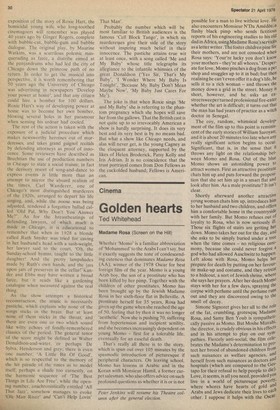Cinema
Golden hearts
Ted Whitehead
Madame Rosa (Screen on the Hill) Whether `Momo' is a familiar abbreviation of 'Mohammed' to the Arabs I can't say, but it exactly suggests the tone of condescending cuteness that dominates Madame Rosa (AA), winner of the 1978 Oscar for best foreign film of the year. Momo is a young Arab boy. the son of a prostitute who has been killed by her pimp. Together with the children of other prostitutes. Momo has been brought up by the Jewish Madame Rosa in her sixth-floor flat in Belleville. A prostitute herself for 35 years, Rosa had given up the game when she reached the age of 50, feeling that by then it was no longer 'aesthetic'. Now she is pushing 70, suffering from hypertension and incipient senility, and she becomes increasingly dependent on young Momo — first for a tolerable life, eventually for an easeful death.
That's really all there is to the story, which is spun out over 105 minutes by the spasmodic introduction of picturesque if peripheral characters. On leaving school, Momo has lessons in Arabic and in the Koran with Monsieur Hamil, a former carpet salesman, who also offers advice on such profound questions as whether it is or is not Peter Jenkins will resume his Theatre column after the general election. possible for a man to live without love. He also encounters Monsieur N'Da Amedee, a flashy black pimp who sends fictitious reports of his engineering studies to his old dad in Africa, using Madame Rosa's services as a letter writer. The foster children pine for their mothers, and are not consoled when Rosa says: `Your're lucky you don't know your mothers — they're all whores.' Desperate for love, Momo pinches a dog from a Pet shop and snuggles up to it in bed; but then realising he can't even offer it a dog's life, be sells it to a rich woman — and throws the money down a grid in the street. Money Is short, however, and he asks an exstreetsweeper turned professional fire-eater whether the art is difficult; it turns out that the man has had years of practice as a witch doctor in Senegal.
The coy, random, whimsical development of the film up to this point is reminiscent of the early stories of William Saroyan; and it is about 20 minutes too late when anY really significant action begins to occur. Significant, that is, in the sense that If throws any light on the relationship between Momo and Rosa. Out of the blue Momo shows an astonishing power to attract women. First an attractive prostitute chats him up and puts forward the proposition that she set him up in a smart flat and look after him. As a male prostitute? It isn't clear.
Shortly afterward another attractive young woman chats him up, introduces hint to her husband and two children, and offers him a comfortable home in the countryside with her family. But Momo refuses out of loyalty to Rosa, who is now seriously ill. Those six flights of stairs are getting her down. Momo takes her out for the day, and she asks to be simply buried under a tree when the time comes — no religious ceremony, because she could never forgive a god who had allowed Auschwitz to happen. Left alone with Rosa, Momo helps her prepare for death by putting on her favour ite make-up and costume, and they retreat to a hideout, a sort of Jewish shrine, where she says her prayers. After her death Morn° stays with her for a few days, spraying the corpse with perfume until the perfume runs out and they are discovered owing to the smell of decay. Simone Signoret gives her all to the role of the fat, crumbling, grotesque Maclaine Rosa, and Samy Ben Youb is sympathetIcally passive as Momo. But Moshe Mizrahl. the director, is crudely obvious in his effects and in his attempt to play on our syily pathies. Fiercely anti-social, the film cele brates the Madame's determination to Pr0. tect her brood of abandoned children frort; such nuisances as welfare agencies, an°, herself from such nuisances as doctors all hospitals (which are compared to the Ges" tapo for their refusal to help people to die). Love, it seems, is all you need, provided you live in a world of picturesque povertY: where whores have hearts of gold an° Arabs and Jews dedicate their lives to each other. I suppose it helps with the Oscar.






































 Previous page
Previous page